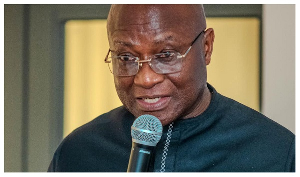Despite the current appreciation of the cedi against foreign trading currencies, businessmen and women, especially shippers, want the managers of the economy to put in extra efforts and policies to ensure a strong local currency.
Shippers have stressed on the government the need to work to maintain the cedi’s stability for the rest of this year to facilitate trade.
According to them, the cedi’s depreciation had impacted adversely on their operations as it resulted in some operational losses.
The Chief Executive Officer of the Ghana Shippers’ Authority, Dr. Kofi Mbiah has pointed out that, the currency’s depreciation is one of the major challenges confronting shippers in the country.
“In our survey of shippers for the first quarter, the issue of the exchange rate came up prominently. At the beginning of this year, we saw a sharp decline in the value of the cedi. However, by the end of the first quarter, we have witnessed a gradual strengthening of the cedi against major international currencies and this is welcome news for shippers as depicted by our survey across the country,” he said.
The cedi has begun appreciating in the beginning of this month, and some economists are predicting further stability of the Cedi in the second quarter of this year.
The economists believe the various measures put in place by government added to the positive IMF review and improved investor confidence will ensure a stable currency.
“The next IMF review is likely to be positive, that will also inject some good news into the economy and help generate market confidence and unlock donor inflows into the economy. With a change in government and the goodwill that comes with Akufo-Addo’s government, we expect that donor partners will respond with the appropriate measures, with some level of inflows into the economy, the next tranche of the IMF money should also help.” A prominent economist Professor Godfred Bokpin said.
The cedi has since the latter part of March 2017, begun recording some stability after depreciating for a significant part of January and February this year.
In March 2017, the local currency depreciated by 7.5 and 8 percent to the British Pound and the Euro respectively.
The Bank of Ghana’s Economic and Financial data also showed that the currency’s depreciation against the dollar for March 2017, was five times more than the rate of depreciation recorded in the same period in 2016.
Figures as at end of February 2017 showed that, the cedi had depreciated by 5.4 percent between January and February of this year alone on the interbank forex exchange market and as much as 6.72 percent in the same period across forex bureaus in the country.
The development affected most sectors of the economy as businesses were finding difficulty to plan because of the uncertainty of the currency’s performance.
Dr. Kofi Mbiah wants a stable currency to ensure certainty and guide long term plans by shippers.
“Shippers would however like government to continue with its efforts aimed at currency rate stability in order to engender certainty and to boost international trade.”
However, Professor Bokpin is optimistic the cedi will gain some stability.
“I expect the stability to continue. I think that a significant stability of the cedi is sustainable. In fact beyond that, it is not even sustainable for our economy itself in terms of the competitiveness of our economy,” he said.
Counting on the cocoa syndicated loan that may be raised soon, Professor Bokpin was of the view that the inflow will further help to stabilize the cedi.
“Beyond that government will soon begin negotiating in terms of the net syndicated cocoa loan and others so probably, speculators will have to take a slip in a bit and then wait and see what happens. But at least some level of stability should be anticipated,” he explained.
But, a global market economist, Mr Ayomide Mejabi, has predicted the local currency will from the third quarter of this year start depreciating at a slower pace to end the year at GH¢4.65 to a dollar.
He explained that the recent performance of the local currency had been largely affected by the good-will from the citizenry after the general election in 2016.
“At the beginning of the year, our prediction was that the local currency will end the year at GH¢4.65 to a dollar, and we still hold the same view,” Mr Mejabi has noted.
Mr Mejabi, who is an economist with Nigeria’s Stanbic IBTC Bank, said cocoa would this year experience slower inflows, which would impact negatively on the cedi.
“The major drivers for the local currency are the commodity prices and foreign investor sentiment. Therefore, with the commodity, we expect oil and gold to perform much better but cocoa would this year experience slower inflows which will impact negatively on the cedi,” he stated.
“The country also expects to receive substantial inflow into its forex reserves which comes from cocoa proceeds, the International Monetary Fund (IMF) disbursement and from Eurobonds. However, the government had clearly indicated in its budget that it will not issue another Eurobond and this will potentially impact negatively on the country’s forex reserve,” he added.
The economist urged businesses in the country to hedge (as precautionary action) in order to manage their capital flow as medium to long term measures to secure their investment.
Foreign exchange hedging, is a method mostly used by companies to eliminate or hedge their foreign exchange risk resulting from transactions in foreign currencies.
“Even if you assume the currency is going to be stable for a while, you can also hedge because many people do not expect the currency to move up in the first quarter of the year but it did,” he said.
“It is a known fact that investors are always interested in channelling their financial resources into “secure” areas of the economy. Most investors prefer to diversify their investments; that is to hold a diversified portfolio. In the same way, local businesses could buy dollars on forward basis, depending on the turn out and hedge at today’s price,” he explained.
Meanwhile, in response to public comments that the current appreciation of the cedi is artificial, the Minister of Finance, Ken Ofori-Atta has asserted that, the stabilisation of the cedi against major currencies especially the US dollar is not deliberately manipulated.
According to him, government has been consistent in tackling the variables of revenue and expenditure. He made these remarks when he addressed the press at the State House on Wednesday, 12 April.
“I think in the end it really depends on us as a people in terms of the confidence we have to be able to be more productive as a people. We as a government, the president is quite clear we should work extremely hard and look at all the indices that create stability and that’s what we are tackling,” he stated, adding: “I’m not sure that there is any issue of artificiality in this because all we have done has been consistently tackling the variables of revenue, expenditure. Capping the earmarked funds was important because it gave us fiscal space and I guess we have to work with labour unions to get some good stability and as we focus on the debt and the debt continues to come down we should be able to sustain it.”
He noted that his ministry was only obeying directives from President Nana Addo Dankwa Akufo-Addo to get the economy back on track.
“We’ve been working hard since we came. The president was clear that we should be in a hurry and we should create the environment in which the private sector will be able to perform and there will be more predictability in the way in which the economy runs and how people will plan,” he added.
Mr Ofori-Atta noted that the budget was aimed at putting the economy back on track, saying: “The budget clearly indicated what I term a preferential option for the poor, at the same time a private sector-led growth. So by abolishing those taxes and creating the tax relief, clearly I think it created economic freedom for people to feel energised and for the entrepreneurial spirit of Ghanaians to come out. So I know with that energy we began to see a pickup in productivity.”
He expressed confidence in the economy due to policies already put in place by government. “The Bank of Ghana went on to reduce the interest rate by 200 basis points and that’s a good indicator of where things are going and then we are also quite blessed with the relationships and networks we have to be able to restructure some of our debt, and I think that kind of cemented the fact that the momentum is building. There is both domestic and international confidence in what we are doing and my suspicion is that we also do administrative things to tighten our sources of foreign exchange,” Mr Ofori-Atta said.
Business News of Sunday, 16 April 2017
Source: asempanews.com

















